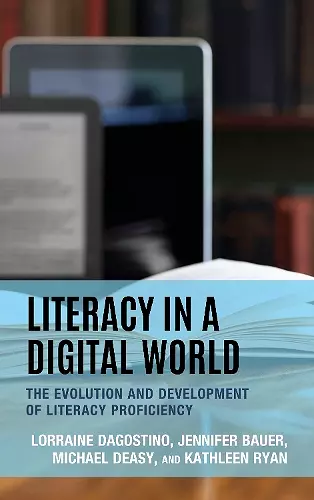Literacy in a Digital World
The Evolution and Development of Literacy Proficiency
Jennifer Bauer author Kathleen Ryan author Lorraine Dagostino author Michael Deasy, EdD author
Format:Hardback
Publisher:Rowman & Littlefield
Published:1st Jan '24
Currently unavailable, and unfortunately no date known when it will be back

The digital revolution has greatly influenced communication, meaning a current, analytical examination of changing literacy skills is needed. Becoming literate in today’s world requires an understanding of traditional and electronic messaging venues in order for communications to not be misled by unrecognized influences.
This book examines changes in the concept of literacy, including, the specific characteristics of evaluation literacy, predictors of literacy efficiency, the nature of audiences and users, and ethical concerns. It also examines the implications and applications for instruction, assessment, and professional development.
The authors of this book provide an interesting historical perspective on the concept of literacy and explore many ways literacy has evolved. Given the misinformation and disinformation that have become part of our society, this book is both important and timely.
Literacy in a Digital World: The Evolution and Development of Literacy Proficiency draws the reader’s attention to both the similarities and the differences between traditional text and digital media, and in doing so, makes a strong case for all of us to understand better the urgent need to be vigilant when reading texts. This book not only presents educational and psychological theories related to literacy but also provides lessons so that educators can help young adults apply strategies that facilitate the skill of critical thinking as they work to distinguish between factual information and false information within the varied types of texts of today. This book will help create citizens who understand the importance of learning how to negotiate texts of all sorts in order to create a society that values truth. There is so much relevant information in this book that it demands to be read and re-read.
-- Athina-Eleni G. Mavroudhis, , Former Director of Psychology and Human Development, Hellenic College Holy Cross, Brookline, MA 02445, [email protected]This book presents both the difficulty and the necessity of achieving literary proficiency in a technological age. It describes the evolution of the concept of literacy and the ways it has been assessed over time. Digital texts require readers to develop a sensitivity to language that differs from the way they have traditionally approached paper texts. The authors detail ways in which specific forms of media direct the way readers evaluate messages, and they encourage educators to incorporate media literacy into their teaching processes. This book should be required reading for educators at every level. It is thoroughly researched, expertly presented, and beautifully written.
-- Mary E. Robbins, PhD, senior associate to the Provost for communication and faculty affairs, University of Massachusetts LowellIt is clear from this book that literacy instruction needs to keep up with advances in technology in a digital world. A clear presentation of the evolution of literacy instruction lays the foundation for the need to adapt literacy instruction and assessment as an ongoing process and to include evaluative literacy as part of this instruction.
The section on assessment is especially helpful, covering different types of assessments and how the principles for assessment presented can guide future work. It demonstrates how media literacy assessment tasks can be more engaging to learners and shows the more authentic ways that digital literacy skills can be assessed at each stage of the assessment process. Student self-assessment with specific guidelines is presented as an important component of the assessment process.
The professional development section shows the forward-thinking needed to address getting educators engaged with these initiatives. Many classroom teachers already see the need for evaluative literacy instruction and assessment revision but may not be as aware of the many recommendations provided by the authors to address current evaluative literacy needs. Possible approaches to effective professional development in media literacy are shared and evaluated, as well as challenges that educators face in transforming literacy instruction in a digital world.
-- Kathy Wesley, kathywes@gmailISBN: 9781475868913
Dimensions: 239mm x 159mm x 19mm
Weight: 426g
162 pages